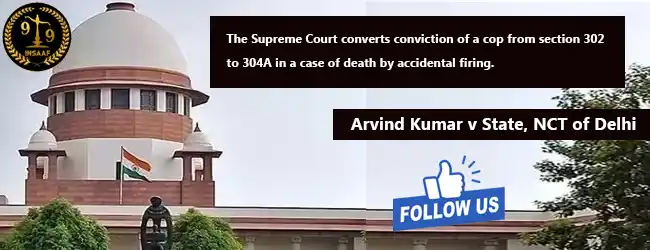2023-Dec-06

The Supreme Court recently held a cop liable under section 304A of IPC and set aside his conviction for murder under section 302 IPC, while observing that under section 304A the maximum punishment stipulated was just 2 years, while the cop had already undergone 8 years in prison. The Supreme Court set the appellant cop free.
The appellant cop had challenged the judgment of the session court which had convicted him under section 302 IPC. The session court had held that the case of the appellant was covered under the ‘3rdly’ in section 300 of IPC and that the appellant had failed to bring his case under exception 4 of Section 300 IPC and sentenced the appellant cop to undergo a life sentence. The appellant cop approached the High Court which upheld the conviction. The appellant cop then approached the Supreme Court and by the time the Supreme Court released the appellant on bail he had already undergone incarceration for a period of 8 years and 11 months.
The brief facts are that one Shashi Bala who was posted as a sub inspector of police was deputed as a duty officer at the I P Estate Police Station when one constable namely Mohd. Rashid (the deceased) was on duty when he came to the reporting room and started talking on the official telephone of the Police Station. When SI Shashi Bala noticed the deceased talking on the phone for 5 to 7 minutes she advised him not to keep the official telephone busy as the Police Station might have received some urgent calls. According to the prosecution the deceased did not pay any heed to the advice of SI Shashi Bala and she asked the appellant who was posted as a guard to tell the deceased to desist from continuing with his conversation on the telephone. The appellant entered the duty room where the deceased was talking on the phone and put his hand on the shoulder of the deceased and advised him to end the call. According to the narrative by the prosecution the deceased playfully pushed the appellant while holding the SAF carbine of the appellant and when the appellant tried to extricate his SAF carbine it git entangled in the chain attached to the appellant’s belt which led to the accidental firing of five rounds from the automatic weapon which hit the deceased’s neck which eventually led to his death.
Initially an offence under section 304A was registered against the appellant, however later on the insistence of the father of the deceased section 302 was added while filing the chargesheet.
The Supreme Court observed thus:
“Thus, the version of PW12 and PW25 who were claiming to be the eyewitnesses completely supports the defence of the appellant of accidental firing and in any case, they have not deposed that the appellant intentionally fired bullets at the deceased. PW22, the father of the deceased, who was not an eyewitness, deposed in support of the case that the appellant intentionally opened fire. But his testimony on motive has been disbelieved by the High Court. Moreover, admittedly, his second statement in which the aforesaid allegation was made, was recorded three to four months after the incident. In his earlier statement recorded by the police after the incident, this version was not found as can be seen from his cross examination.”
“Going by the evidence of prosecution witnesses, it will have to be held that the SAF got entangled with the chain attached to the belt of the appellant. Considering the opinion of the expert, it is obvious that when the incident occurred, the change lever was not kept in a safety position by the appellant and therefore, SAF got cocked which resulted in the firing of five bullets. The appellant must take the blame for not taking the elementary precaution of keeping the change lever in the safety position”
“The prosecution has failed to prove that the appellant had either any intention of causing the death of the deceased or the intention of causing such bodily injury to the deceased which was likely to cause his death. Assuming that when the appellant approached the deceased to stop him from using the telephone, he was aware that the change lever was not in a safety position, it is not possible to attribute knowledge to him that by his failure to keep SAF in the safety position, he was likely to cause the death of the deceased. The knowledge of the possibility of the deceased who was himself a policeman pulling SAF carbine cannot be attributed to the appellant. In fact, the appellant could not have imagined that the deceased would do anything like this. Thus, by no stretch of the imagination, it is a case of culpable homicide as defined under Section 299 of IPC as the existence of none of the three ingredients incorporated therein was proved by the prosecution.”
“Hence, the appeal is partly allowed. The conviction of the appellant under Section 302 of the IPC is set aside and he is held guilty of committing the offence punishable under Section 304A of IPC. The appellant has undergone the maximum sentence prescribed for the said offence. Hence, his detention in prison is no longer required. Hence, his bail bonds are cancelled.”
What can the Legal Experts do for you? Our team of lawyers is ready to help you in minutes with any legal question.
 Whatsapp
Whatsapp
 Toll Free :-
1800-212-9001
Toll Free :-
1800-212-9001